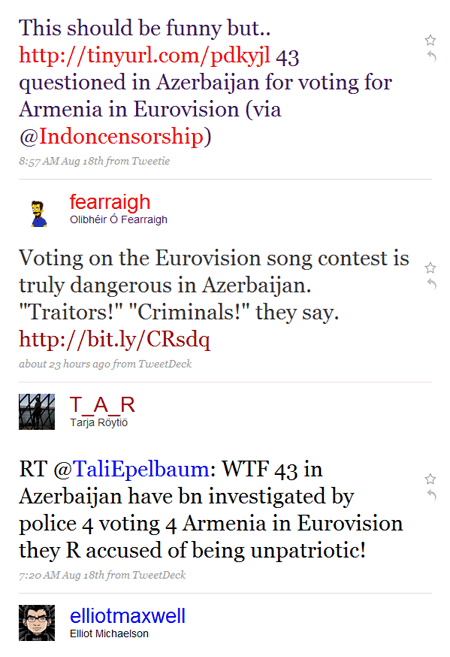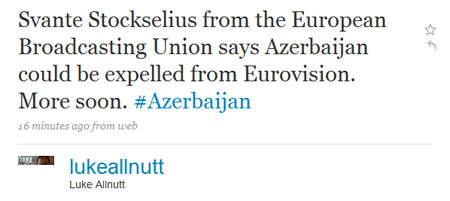Azerbaijan: Even more Eurovision stupidity
Music lovers the world over might consider it to be some kind of dumb competition where the most mediocre of talent gets its brief moment of fame, but for tin-pot dictators in the South Caucasus, Eurovision is taken very seriously indeed. Forget the spirit in which the competition was meant to be held, for Armenia, Azerbaijan and Georgia it’s most definitely not about friendly competition. Instead, it’s about nationalism, and sometimes in the ugliest of forms.
The competition had already got off to a bad start in February when Georgia entered an entry mocking the Russian prime minister, former President Putin, but then Armenia and Azerbaijan soon took the level of animosity to even greater heights with actions that bordered on the infantile. This might be reason enough for many to consider Eurovision as more absurd than it already is, but when the two countries remain in a state of war, even a simple and otherwise mundane song contest takes on a frightening new dimension.

Rovshan Nasirli was called in for questioning. “They wanted an explanation for why I voted for Armenia. They said it was a matter of national security,” Nasirli told Radio Free Europe. “They were trying to put psychological pressure on me, saying things like, ‘You have no sense of ethnic pride. How come you voted for Armenia?’ They made me write out an explanation, and then they let me go.” Ironically, the 22-year-old added that he voted for Armenia because it sounded “more Azeri” than his own country’s entry.
With Armenia and Azerbaijan reportedly close to hammering out a framework peace deal agreement to end the long-running conflict over the disputed territory of Nagorno Karabakh, such actions by the Azeri authorities are certainly not condusive to restoring trust between the two neighbouring countries.
It also remains unclear why the authorities waited until now to effectively intimidate its own citizens who managed to vote for Armenia despite reports that the number for doing so was not displayed during the local live broadcast.
However, the timing could have something to do with the release of data for televoting at the beginning of the month. Coming third in the competition as a result of votes from a jury, Azerbaijan’s entry by Aysel and Arash came second in terms of those cast by the public. Even so, it remains uncertain whether Azerbaijan will be permitted to enter the competition next year as a result of the somewhat draconian action taken against at least one of its own citizens.

In an interview with the APA news agency, Svante Stockselius, Executive Supervisor of Eurovision, says that competion organizers are taking the latest developments surrounding Armenia and Azerbaijan very seriously: “The European Broadcasting Union is aware of the rumours and accusations made in the media and started last week to investigate the matter. The investigation will involve our technical partners and also gives our Member Broadcasters the chance to respond. Until this investigation is completed we cannot comment further on these rumours and accusations.”
Meanwhile, in stark contrast to the mood towards Armenians in Azerbaijan, a festival of Azeri films is set to take place in October in the capital, Yerevan. Following the international outcry surrounding the detention of persecution of video blogger youth activists Adnan Hajizadeh and Emin Milli as well as this week’s news of the death in prison of a newspaper editor, it seems as though the authorities in Baku are hell bent on bringing the image of their country down to new and even lower levels.
If that was the intention, they appear to be doing a good job…
